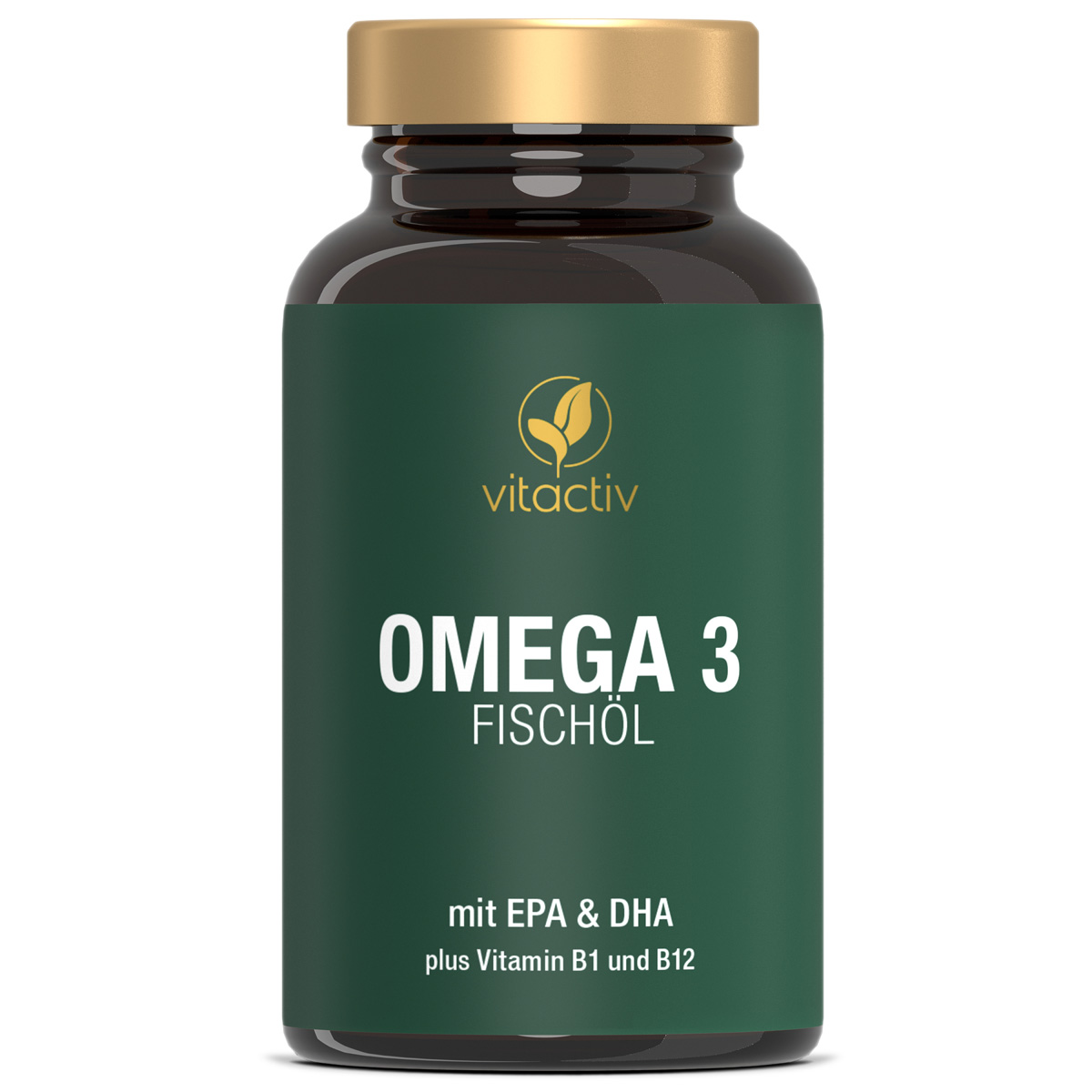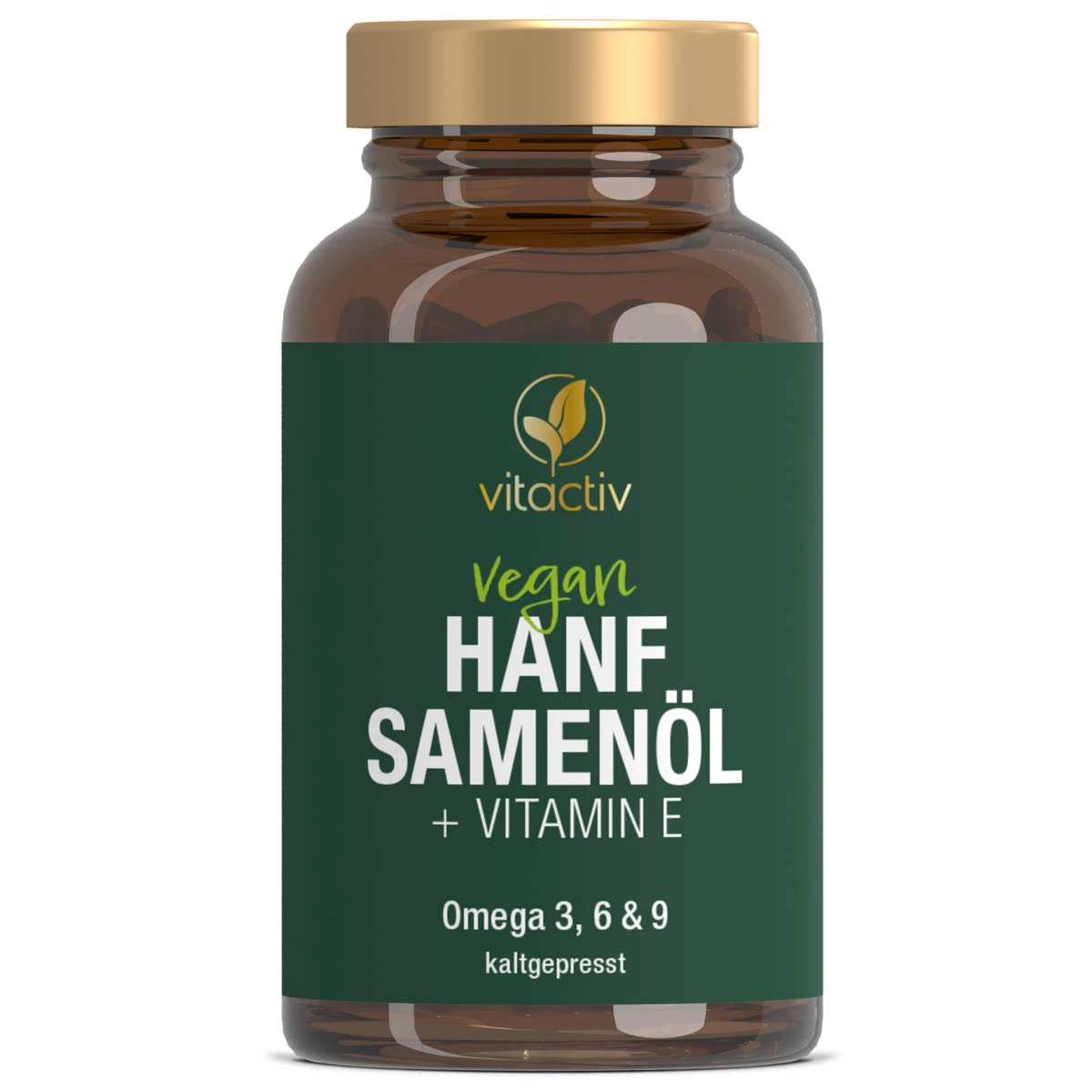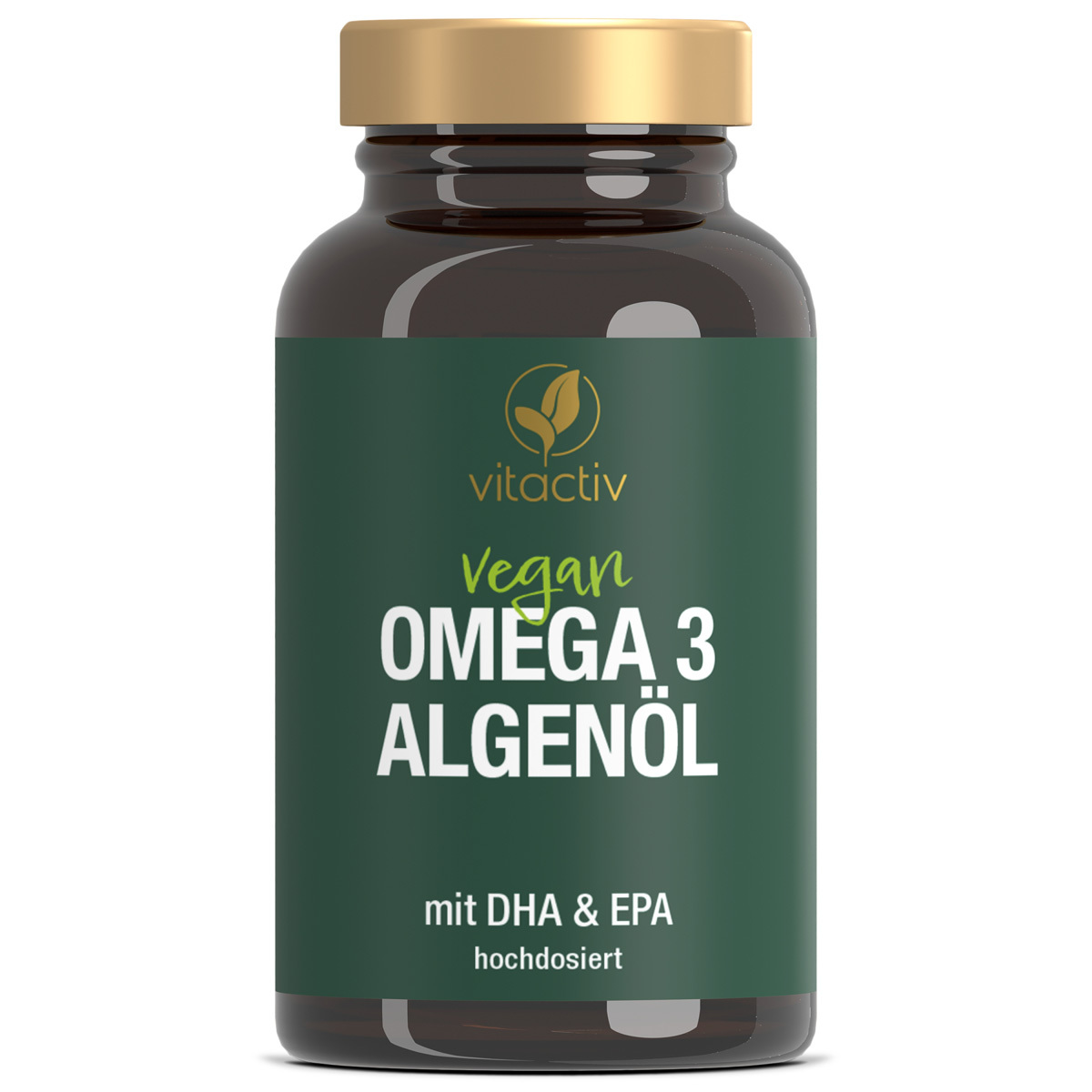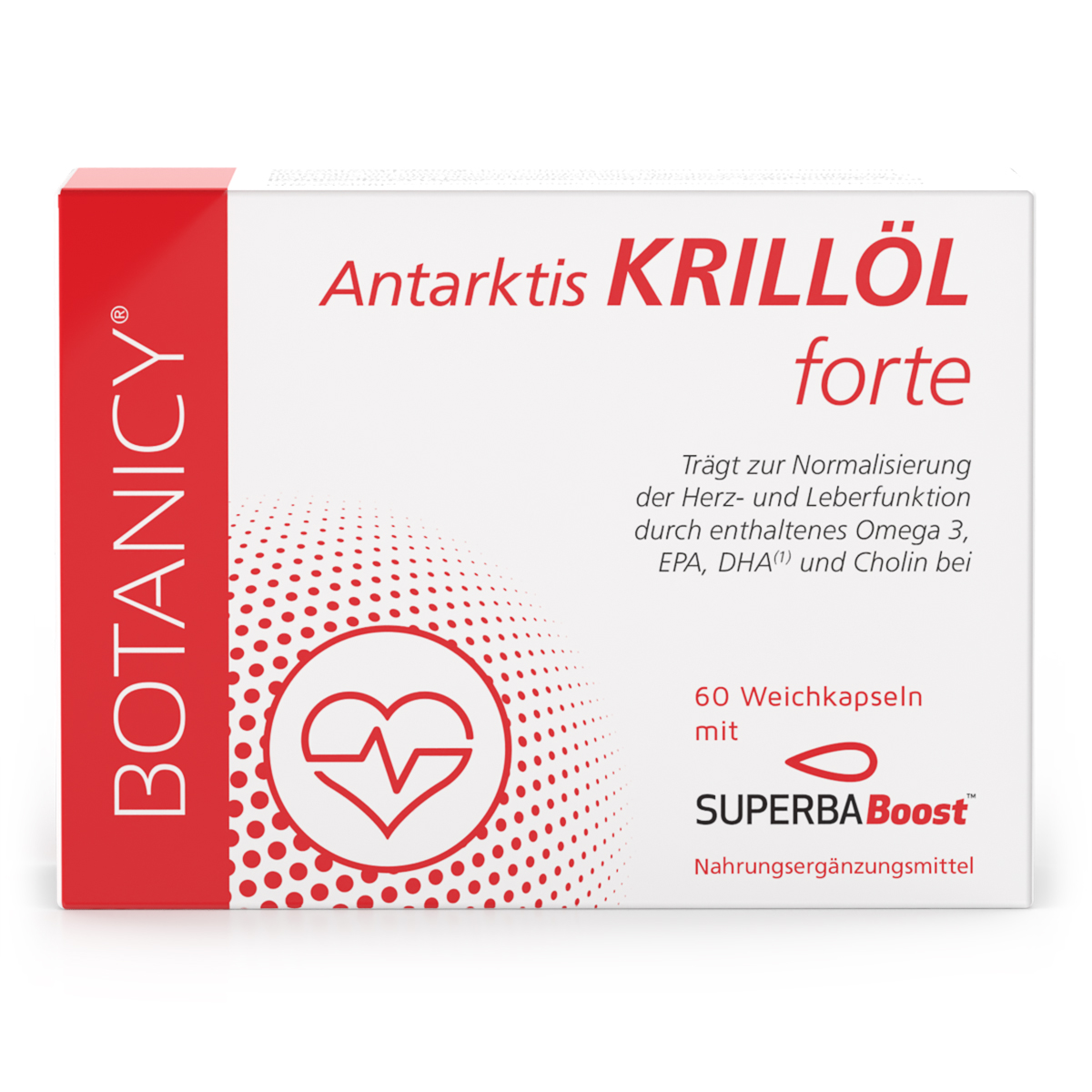Omega 3 6 9
Content: 0.0386 kg (€232.90* / 1 kg)
€9.99 (€258.81 / 1 kg)Content: 0.044 kg (€249.77* / 1 kg)
€12.99 (€295.23 / 1 kg)Content: 0.0414 kg (€410.39* / 1 kg)
€18.99 €19.99
(€458.70 / 1 kg)Content: 0.0495 kg (€429.09* / 1 kg)
€24.99 (€504.85 / 1 kg)Omega 3 6 9 - Info & facts
Most people eat too little fish. Yet fish provides valuable omega-3 fatty acids. And these are vital for humans! But what is omega 3 good for? In short: for heart health, brain function and eyesight. Unsaturated compounds (fatty acids) are even reported to protect against inflammation and cardiovascular disease.1 People who do not eat fish, or only eat it very rarely, lack these essential substances. Omega-3 capsules as a dietary supplement are a very good alternative to ensure the necessary intake of omega fatty acids. High-dose capsules are Fish Oil Omega 3 1000 with 1,000 milligrams of fish oil per capsule.
Convince yourself of our high-quality products with omega fatty acids. And find out exactly what omega-3 fatty acids are and how they differ from omega 6 and 9. You can also find all the information here about how important essential omega-3 fatty acids are for the body, which foods contain a lot of omega 3, in what form omega 3 is available as a dietary supplement and what alternatives are available for vegans and vegetarians.
What is the difference between omega 3, 6 and 9 fatty acids?
The biggest difference between omega 3 6 9 fatty acids (omega n fatty acids) is that omega 9 fatty acids are monounsaturated fatty acids and can be produced in the body. In contrast, the polyunsaturated fatty acids omega 3 and omega 6 are essential fatty acids. This means that our body cannot produce them itself and must be obtained from food.
As we normally consume more foods containing omega 6, we should ensure that we supply our body with vital omega 3 fatty acids - in the appropriate ratio. The optimum ratio is 5:1 (five parts omega-6 fatty acids to one part omega-3 fatty acids). The German Nutrition Society (DGE) recommends that 0.5 percent of the daily energy intake should be covered by the alpha-linolenic acid contained in omega-3.1 For adults, this corresponds to around 1.25 grams of omega-3 fatty acid per day.
What exactly are omega-3 fatty acids?
Omega-3 fatty acids - just like omega-6 fatty acids - are essential (vital) polyunsaturated fatty acids. As our body cannot produce these itself, they must be obtained from food.
Omega fatty acids are among the "good" fats, as they are unsaturated fatty acids (also known as "essential fatty acids"). Saturated fatty acids, on the other hand, belong to the "bad fats" - they increase the risk of cardiovascular disease if consumed in excess.2 The special thing about omega-3 fatty acids for health support is their most active forms:
- EPA (eicosapentaenoic acid)
- DHA (docosahexaenoic acid)
Alpha-linolenic acid (ALA) is also an omega-3 fatty acid. However, it is first converted to EPA and DHA in the body. The highest amounts of DHA & EPA omega 3 are found in fatty fish such as salmon, herring, sardines and mackerel. However, if you don't like eating fish, you don't have to do without the valuable omega-3 fatty acids, but can take (tasteless) supplements with natural fish oil.
How important are omega-3 fatty acids for the body
In short: for heart health, brain function and vision. Unsaturated compounds (fatty acids) are even reported to protect against inflammation and cardiovascular disease.3 Omega-3 capsules as a dietary supplement are a very good alternative to ensure the necessary intake of omega fatty acids. For example, we recommend our high-dose Omega 3 1000 fish oil capsules with 1,000 milligrams of fish oil per capsule. Convince yourself of our high-quality products with omega-3 fatty acids!
Omega-3 fatty acids have been proven to support health. The European Food Safety Authority also confirms the following effects of EPA and DHA with sufficient and regular intake:
Heart
EPA and DHA contribute to the maintenance of normal heart function. These two valuable omega-3 fatty acids can therefore make an important contribution to heart health. The positive effect is achieved with a daily intake of 250 mg EPA/DHA.2
Brain
DHA contributes to the maintenance of normal brain function. The positive effect is achieved with a daily intake of 250 mg DHA.2 Did you know that up to 15% of the fat in brain cells is DHA (docosahexaenoic acid)?
Vision
DHA contributes to the maintenance of normal vision. The positive effect is achieved with a daily intake of 250 mg DHA.2 Incidentally, 60% of the vital fatty acids in the photoreceptors are DHA.
Unborn babies and infants
DHA supports the normal development of the eyes and brain of unborn and breastfed babies. Pregnant or breastfeeding women are advised to consume 200 milligrams of DHA per day in addition to the recommended DHA and EPA intake of 250 milligrams.
Which foods contain a lot of omega 3
We can consume omega-3 fatty acids through various foods . Here are some foods that contain particularly high amounts of omega-3 fatty acids:
- Salmon - whether raw, cooked, smoked or fried.
- Herring - because it is also a fatty fish.
- Sardines - not everyone likes them, but they are a good source of omega 3.
- Mackerel - very aromatic and easy to bone. It is often grilled.
- Linseed oil - one of the best plant-based sources of omega-3 fatty acids.
- Chia seeds - like linseed, a good source of plant-based fatty acids.
- Walnuts - a very good source of omega-3 (including walnut oil).
Can I meet my omega-3 requirements through my daily diet? Yes, you can. However, you need to make sure that you eat foods that are high in omega 3 every day. If you don't manage to eat a balanced diet every day, no problem: you can avoid an undersupply with high-quality food supplements - such as our fish oil OMEGA 3 1000 mg capsules.
Omega 3 6 9 in capsule or powder form
Omega fatty acid supplements are mainly available in capsule form, filled with fish oil powder or with liquid fish oil or krill oil. As the liquid form is the most natural, we at the Feelgood Shop rely on gel capsules with liquid oil.
Fish oil
Fish oil capsules with high doses of omega-3 fatty acids are easy to take in terms of size - another advantage: a neutral taste. If you want to buy particularly high-quality omega 3 at a low price, the top product Fish Oil Omega 3 1000 is just right for you!
Krill oil
Krill oil is a high-quality alternative to fish oil. The omega-3 fatty acids in krill, a small crustacean native to the Antarctic, can be utilized very well by our bodies. The fishy taste and the typical fishy burp are also absent here, as the capsules are largely tasteless. The krill oil in the Antarktis KRILLÖL forte capsules show particularly good scientific results.4
Fish oil alternative: vegan omega-3 capsules with algae oil
As omega-3 is mostly found in fish, vegans and vegetarians can easily suffer from an omega-3 deficiency. Appropriate food supplements can counteract this deficiency if taken regularly.
The following vegetable oils are effective alternatives for food supplements for vegans and vegetarians - and people who prefer a low-fish diet. The vegan ALGENÖL Omega 3 VEGAN capsules provide a perfect supply of omega 3. The vegetarian HANFSAMEN ÖL + Vitamin E capsules contain omega-6 and omega-3 fatty acids in an ideal 3:1 ratio.
Sources:
1https://www.dge.de/wissenschaft/referenzwerte/fett/?L=0
2https://de.wikipedia.org/wiki/Ges%C3%A4ttigte_Fetts%C3%A4uren
3https://www.spiegel.de/gesundheit/ernaehrung/fisch-ist-immer-gesund-ob-frisch-tiefgekuehlt-oder-aus-der-dose-a-1145958.html
4https://www.ncbi.nlm.nih.gov/pmc/articles/PMC4678523/
Frequently asked questions
Should I take omega-3 capsules or oil?
You can decide according to your personal taste and feelings. Both products are an optimal source of omega-3 fatty acids and are made from natural fish oil from sustainable wild catches. Capsules are good for transportation when travelling and for people who don't like to take oil on its own. Those who don't like the fishy taste and smell are much better off with capsules.
What is behind the advertising for omega-3 fatty acid supplements?
Particularly on the internet, omega-3 fatty acid products are repeatedly advertised with unauthorized claims such as "to protect against heart attacks and strokes", "help with arthritis and joint problems" and "protection against breast cancer".
However, food supplements containing omega-3 fatty acids belong to the category of (food supplements) and are not suitable for the treatment of diseases.
In the case of omega-3 fatty acid products for children, infants or the unborn child (products for pregnant women), the following statements have been scientifically proven:
- Intake of docosahexaenoic acid (DHA [100 mg daily]) contributes to the normal development of vision in infants up to 12 months of age.
- The intake of DHA by the mother (200 mg daily in addition to the daily dose of 250 mg recommended for adults) contributes to normal brain/eye development in the fetus and breastfed infant.
However, these effects are only achieved if a certain amount of these high-quality fatty acids is consumed daily. The products must therefore be labeled accordingly.
With a daily intake of 2 g of the omega-3 fatty acid α-linolenic acid and 10 g of the omega-6 fatty acid linoleic acid, the following statement may also appear on the product: "Essential fatty acids are needed for healthy growth and development in children."
What should I look out for when using products containing omega-3 fatty acids?
Products with a manufacturer's recommended intake of up to 5 g EPA and DHA (in combination) or 1.8 g EPA (individually) per day are considered safe for adults according to the European Food Safety Authority. A warning that the amount of 5 g per day should not be exceeded is prescribed for dosages of 2 g per day or more for food supplements and fortified foods. Higher doses can change the flow properties of the blood, prolong the bleeding time and thus increase the risk of bleeding.
Can I cover my daily requirement with food?
As a general rule, healthy people with a complete and balanced diet consume sufficient omega-3 fatty acids. If you do not eat fish, e.g. if you follow a vegan diet, you will hardly get any eicosapentaenoic acid (EPA) and docosahexaenoic acid (DHA). In addition, the conversion of the n-3 fatty acid alpha-linolenic acid (ALA) to EPA and DHA is severely limited in the human organism. EPA and DHA can then be supplied via fortified foods or high-quality food supplements.
What ingredients are contained in food supplements containing omega-3 fatty acids?
The omega-3 fatty acid products offered as food supplements are often oil-filled or powder-filled capsules. Most of them contain natural fish oil or natural krill oil, some contain ALA-rich vegetable oils (e.g. from linseed or perilla or black nettle) or EPA- and DHA-rich oils from microalgae (Schizochytrium, Ulkenia).
Anti-inflammatory omega-3 sources: What to look out for?
Make sure that the food supplements have been tested and certified in Germany or the EU. If an online supplier seems dubious for any reason, it's better to steer clear of their products - after all, it's about your body and your health.
Why should you use omega-3 fatty acids?
Fats have different effects on our body. While some form fat deposits, omega-3 fatty acids, for example, are vital for the body. The omega-3 fatty acids eicosapentaenoic acid (EPA) and docosahexaenoic acid (DHA) in particular perform important functions:
- EPA supports the maintenance of normal heart function.
- DHA contributes to the maintenance of normal brain, vision and heart function.
However, these essential fatty acids cannot be produced by the body itself and must be supplied through food. As this is not always possible due to an unbalanced diet, stress or increased demands, you can also cover your requirements with dietary supplements.
How does omega 3 work and why do I need it?
Omega-3 fatty acids contribute to the maintenance of normal heart function. In addition, the EPA and DHA contained in omega 3 - via the mother - also contribute to the normal development of the eyes and brain of the fetus and the breastfed infant.
How do you recognize omega-3 deficiency?
Possible symptoms of an omega-3 deficiency are
- Muscle weakness
- visual impairment
- Feeling restless
- tiredness
- skin problems
A weakened immune system, which increases the risk of infections and inflammation, can also indicate an omega-3 deficiency.
If you have any questions or need advice, please contact us.
Call us at:
0800 678 7997
Write us a message here
Use our chat at the bottom left
Search our FAQs here




